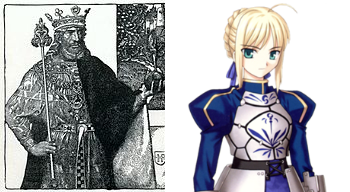Alternative history has recently gained my interest. I define it as the "what if's" and "could have been's". Sometimes, history isn't all what it seems, especially since the victors of wars are the ones to write it. And nothing is preventing it from being rewritten... The conspiracy and pseudo-science filled Assassin's Creed franchise is one example. I'll expand on that lore in another post. For now, I want to look at the Japanese media franchise, Fate/Zero. It's actually the prequel to Fate/stay night, which was originally a Japanese visual novel, essentially a character driven narrative consisting of a video game and a dating simulation with some very suggestive/explicit themes. I never got into Fate/stay night or its subsequent anime adaptation, but the Fate/Zero anime adaptation really captivated me.
The plot: 7 "Masters" each summon a "Heroic Spirit" from the past in one of 7 classes (Saber, Lancer, Archer, Rider, Caster, Assassin, and Berserker). These "Servants" then battle it out in Fuyuki City for the coveted Holy Grail. This particular battle royale is the fourth Holy Grail War.
Although there are many aspects of magic and fantasy, the most interesting and relevant part of Fate/Zero are the Servants, as they are each based on a once living or mythological person. The main protagonist is Saber, who is actually King Arthur, King of Knights. Forced to ascend to the throne, she sacrificed her otherwise normal feminine life to save Britain. Another hero, Rider, is Alexander the Great, also known as Iskandar and the King of Conquerors. In both cases, as seen below, they defy what we know about these historic figures: King Arthur was actually female, and Alexander was not a short man as he is described to be. More historical comparisons can be found here.
Aside from using real historical backgrounds and mythologies, the series delves into much philosophical ideals, with themes including morality, being a king, insanity, and tragedy. The series is also beautiful, both visually and aural. I could wax on and on about how awesome the franchise and series is, but I will spare you, because videos are worth a million words. :)
Archer (Gilgamesh) versus Berserker (Lancelot), while the rest of the heroes watch in awe. Notice the insanely fluid animation and epic soundtrack. Watch it on the YouTube page for maximum awesomeness. Later, they fight in the air on friggin' jets. No lie, but YouTube has since removed those clips.
YouTube's pretty anal about removing copyrighted material, so here are links to the opening themes on Vimeo. They offer a great glimpse into what the series is about in 1.5 minutes each.
http://vimeo.com/39949297
Amazing ending theme depicting each of the heroes in historical context: http://vimeo.com/31497071
Amazing ending theme depicting each of the heroes in historical context: http://vimeo.com/31497071
The action scenes and deep character interactions in the anime kept me interested. I've since looked up each historical figure and learned a lot. It's legally streamed at Crunchyroll, and the series will end with episode 25 at the end of June. I'm glad this series was picked up for simulcast (simultaneous broadcasting in places other than Japan), because it deserves as much exposure as possible. I dare say this is better than that Game of Thrones that everyone talks about nowadays... Although I admit, I should watch that too.

